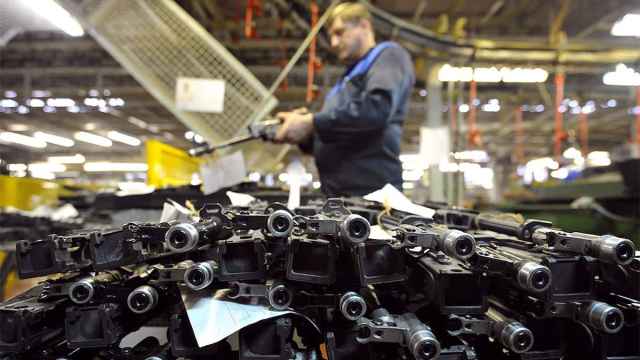In a meeting with Volga Federal District media professionals on Saturday, President Dmitry Medvedev essentially buried his earlier proposal for government officials to declare their large expenditures.
Russia, along with 139 other countries, is a signatory to the United Nations Convention Against Corruption. The only problem is that when the State Duma ratified this convention, it insisted on excluding one of its most important articles: Article 20, which states that illicit enrichment — a significant increase in the assets of public officials that they cannot justify in relation to their declared income — is a criminal offense.
On May 20, the Duma once again failed to pass a bill ratifying Article 20. As recently as August 2009, Medvedev supported the idea of reporting and monitoring government officials’ large expenditures.
But then the president reversed course. For example, Medvedev promised to thoroughly investigate the death of Hermitage Capital lawyer Sergei Magnitsky in pretrial detention. Any serious investigation, however, would have meant that the main suspects in the case would have had to explain how they were able to spend millions of dollars on purchasing luxurious houses with such small family incomes.
And that is not all. Anyone viewing a photograph published in Vedomosti and other newspapers of First Deputy Moscow Mayor Vladimir Resin might ask how, with an official income of 22 million rubles ($706,000) in 2010, he happens to own a pair of watches costing $1 million and $425,000.
How can we reconcile the fact that Prime Minister Vladimir Putin has declared his official income in 2010 as 5 million rubles ($161,000) with the claim by businessman Sergei Kolesnikov that he built a mansion for Putin near Gelendzhik costing $1 billion?
The U.S. president has only two official residences — the White House and Camp David. He can use them while in office, of course, but they don’t belong to him personally. Putin, however, has 26 residences, according to Kommersant. Based on the number of government residences, Russia is a real superpower, not the United States, and is second only to North Korea.
When U.S. President Jimmy Carter was president, he sold the U.S. presidential yacht, the USS Sequoia, to cut government expenses, and the country has not had a presidential yacht ever since. The Russian collection of official yachts includes the $50 million Olympia, the Kavkaz and Pallada yachts, the Burevestnik, the river craft Rossia and the $30 million Sirius, recently acquired by the presidential administration. Based on the number of these mega-yachts, Russia is much more of a superpower than the United States.
U.S. President Barack Obama wears a $200 watch. Putin favored Patek Philippe watches until he later fell in love with Blancpain. Putin gave away one of these watches to a Russian boy in August 2009, and had to give away a second only one month later to a worker in the Tula region who asked for his watch as a “souvenir.”
The following month, Putin traveled to China where journalist Andrei Kolesnikov spotted him wearing another Blancpain. Judging by the number of expensive watches owned by its top leaders, Russia is a superpower and the United States is not.
Unfortunately, the world does not pay attention to leaders’ watches, yachts or official residences. And as it turns out, President Dmitry Medvedev — who sports watches by Franck Muller and Breguet made from white and yellow gold, while his official income in 2010 was just 3.4 million rubles ($110,000) — also prefers turning a blind eye to the question of officials’ watches and yachts.
Yulia Latynina hosts a political talk show on Ekho Moskvy radio.
A Message from The Moscow Times:
Dear readers,
We are facing unprecedented challenges. Russia's Prosecutor General's Office has designated The Moscow Times as an "undesirable" organization, criminalizing our work and putting our staff at risk of prosecution. This follows our earlier unjust labeling as a "foreign agent."
These actions are direct attempts to silence independent journalism in Russia. The authorities claim our work "discredits the decisions of the Russian leadership." We see things differently: we strive to provide accurate, unbiased reporting on Russia.
We, the journalists of The Moscow Times, refuse to be silenced. But to continue our work, we need your help.
Your support, no matter how small, makes a world of difference. If you can, please support us monthly starting from just $2. It's quick to set up, and every contribution makes a significant impact.
By supporting The Moscow Times, you're defending open, independent journalism in the face of repression. Thank you for standing with us.
Remind me later.





